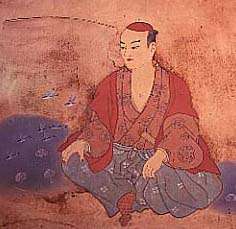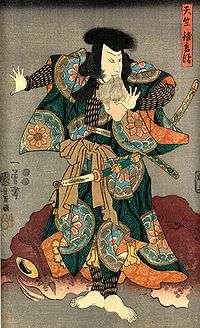Tenjiku Tokubei
Tenjiku Tokubei (1612 - c. 1692) (Japanese: 天竺徳兵衛) was a Japanese adventurer and writer of the early 17th century. He traveled to Southeast and South Asia, hence his "Tenjiku" (Japanese: 天竺, East Asian name of "India") nickname.

He was born in Sendo-machi, Takasago-cho, in today's Hyōgo Prefecture in 1612. His father was a salt wholesaler.
The adventurer
At the age of fifteen, in 1626, Tokubei was hired by a trading company in Kyoto. He pursued commercial activities aboard Japanese Red Seal Ships.
In 1627, Tokubei visited China, Vietnam and Siam (modern Thailand) on board a Japanese Red Seal ship. He would stay for some time in Siam and again visit the country on board one of the ships of the Dutch adventurer Jan Joosten van Lodensteijn.[1] He also sailed to India, to the source of the Ganges,[2] and the country of Magadha,[3] and returned with great wealth and numerous stories to tell.[4]
Upon his return to Japan, and after the introduction of the Seclusion policy (Sakoku), Tokubei wrote an essay titled "Tenjiku Tokai Monogatari" (天竺渡海物語, literally "The Tale of Crossing the Sea to India") on his adventures in foreign countries, which became very popular in Japan.
He died around the age of 80 in his home town of Takasago.
The Kabuki character

Tenjiku Tokubei became a popular character of Kabuki and Joruri puppet dramas, where he was given the role of a magician. He was a popular subject of woodcut prints in the 18th and 19th century.
In September 1795, Kunitaro played the role of Tokubei's wife in the drama "Tenjiku Tokubei Kikigaki Ôrai", while the role of Tenjiku Tokubei was played by Arashi Koroku III.
Notes
- Kansai Kippo News Vol.11 No.490 Wednesday, February 23, 2005 Archived June 13, 2008, at the Wayback Machine
- The Russo-Japanese War: A Photographic and Descriptive Review by Richard Harding Davis - Page 458 "Tokubei travelled in India as far as the source of the Ganges"
- "When he was fifteen years old, in 1626, he was employed by a trading company in Kyoto worked in Siam (Thailand) and Magadha (India). After that, in 1630, he went to India again in a Dutch ship, with Jan Joosten, a Dutchman, and traded there." Takasago City website "Archived copy". Archived from the original on 2009-11-13. Retrieved 2008-06-15.CS1 maint: archived copy as title (link)
- Kabuki; the Popular Stage of Japan - Page 187 by Zoë Kincaid 1965 "Tokubei sailed away on unknown seas to India and returned with wealth greater than that of a daimyo, many strange tales to relate..."